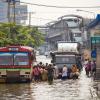
IIASA is a longstanding member of the Zurich Flood Resilience Alliance, which will now be known as the Zurich Climate Resilience Alliance to address a broader range of climate hazards including floods, heatwaves, and wildfires, and work towards systemic change. This shift reflects the growing urgency to enhance climate resilience in communities around the world as climate-induced disasters become more frequent and severe.
The Alliance is a global collaboration between various humanitarian organizations, NGOs, research institutions, and private sector partners, all working towards a common goal: to build resilience in both rural and urban areas, enabling communities to better withstand and recover from climate hazards.
For more than a decade, the Alliance has worked with over 500 communities across 24 countries initially concentrated on flood resilience, positively impacting more than 3 million lives, many of those in the Global South. Their efforts have shifted the traditional approach from post-disaster recovery to proactive, pre-disaster resilience building. This has been supported by strong scientific evidence and co-generation research, much of which has been provided by research partners like IIASA.
IIASA has played a crucial role in the Alliance, applying its expertise in systems science to measure resilience and support the development of community-based strategies for flood resilience. The Institute's research focuses on understanding and measuring resilience, improving decision-making, and supporting policy and advocacy efforts. By integrating both hard and soft systems science, IIASA has helped to inform and guide the Alliance's approach, ensuring that interventions are resilience-centred, effective, and sustainable.
“As the Alliance expands its scope to include a wider range of climate hazards, it will more strongly adopt a systems change approach, aiming to support the interconnected components and dynamics of vulnerable community systems, thereby delivering transformational impact on a larger scale. The goal is not just to implement isolated interventions, but to create lasting changes that can significantly enhance the resilience of entire communities in the context of increasingly severe and systemic climate-related risk,” explains IIASA Systemic Risk and Resilience Research Group Leader, Reinhard Mechler.
The Alliance's vision is to create a world where communities are resilient to climate hazards, enabling them to thrive despite the challenges posed by climate change. By 2027, the Alliance aims to positively impact 5.5 million people, with a longer-term goal of reaching 70 million people by 2035. This ambitious target will be achieved through a combination of community-centered programming, evidence-based research, and influencing key stakeholders at local, national, and global levels.
In this new phase, the Zurich Climate Resilience Alliance will continue to work with its long-standing partners, including IIASA, the Zurich Foundation, Practical Action, the International Federation of the Red Cross (IFRC), Concern Worldwide, Mercy Corps, ISET International, Plan International, and the London School of Economics and Political Science. This comprehensive partnership is essential for the Alliance's work, providing the resources and expertise needed to tackle the complex challenges of climate resilience and drive systemic change to create a more resilient future for vulnerable communities around the world.
Further information
https://iiasa.ac.at/projects/zurich-climate-resilience-alliance
News

03 February 2025
Dr. h.c. Johan Kuylenstierna receives prestigious H.M. The King's Medal

17 January 2025
IICA explores research opportunities with IIASA

05 December 2024

